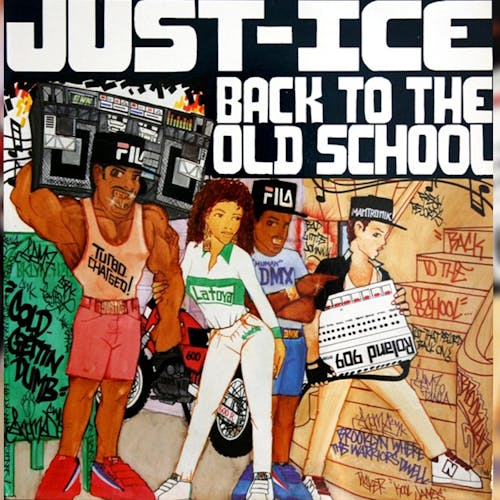
HIP-HOP’S BEST-KEPT SECRET: THE STORY OF THE EXTRAVAGANT 3
HIP-HOP’S BEST-KEPT SECRET: THE STORY OF THE EXTRAVAGANT 3
By Ben Merlis
Published Thu, June 25, 2020 at 12:35 PM EDT
Beneath Hip-Hop’s surface lies a wellspring of untold stories about the players that made the movement what it is today. Even the most diehard of fans may be unaware of the story of the Extravagant 3. Founded by three teens from Queens in 1983, the group may not even be a footnote in the annals of rap. They lasted six months, never made a record, and never played a single show, but the experiences of MCs Dr. Butcher (né Jazzy Drewski), Royal Rich, and LL COOL J served as a jumping-off point for a handful of musical careers. Dr. Butcher is best known for his turntablism and production work in the ’90s with Kool G Rap; LL COOL J ascended to solo MC superstardom in late ’84, initially with help from an occasional Extravagant 3 DJ named Cut Creator (Phil Jean-Remy, the first of two people bearing the moniker). Contrary to accepted mythology, LL didn’t appear out of nowhere fully formed. He worked hard for many years, collaborating with many people along the way.
The Extravagant 3 existed at the beginning of many regime changes in Hip-Hop. It was the tail end of the era when group names ended in numbers, live instrumentation was used on records, and outrageous performing outfits were par for the course. It was the beginning of drum machines, synthesizers, scratching, and street clothes. A New School of MCs, DJs, and producers were supplanting the careers of what came to be known as the Old School — rap’s first generation. The old guard was generally born in the late ’50s through the early ’60s and primarily came out of the Bronx and Harlem. This new generation consisted of folks born in the mid ’60s through the early ’70s and often came from Queens, Brooklyn, and Long Island.
A combination of skill, luck, and enthusiasm brought the Extravagant 3 together, and those same forces put them on extremely different life trajectories.
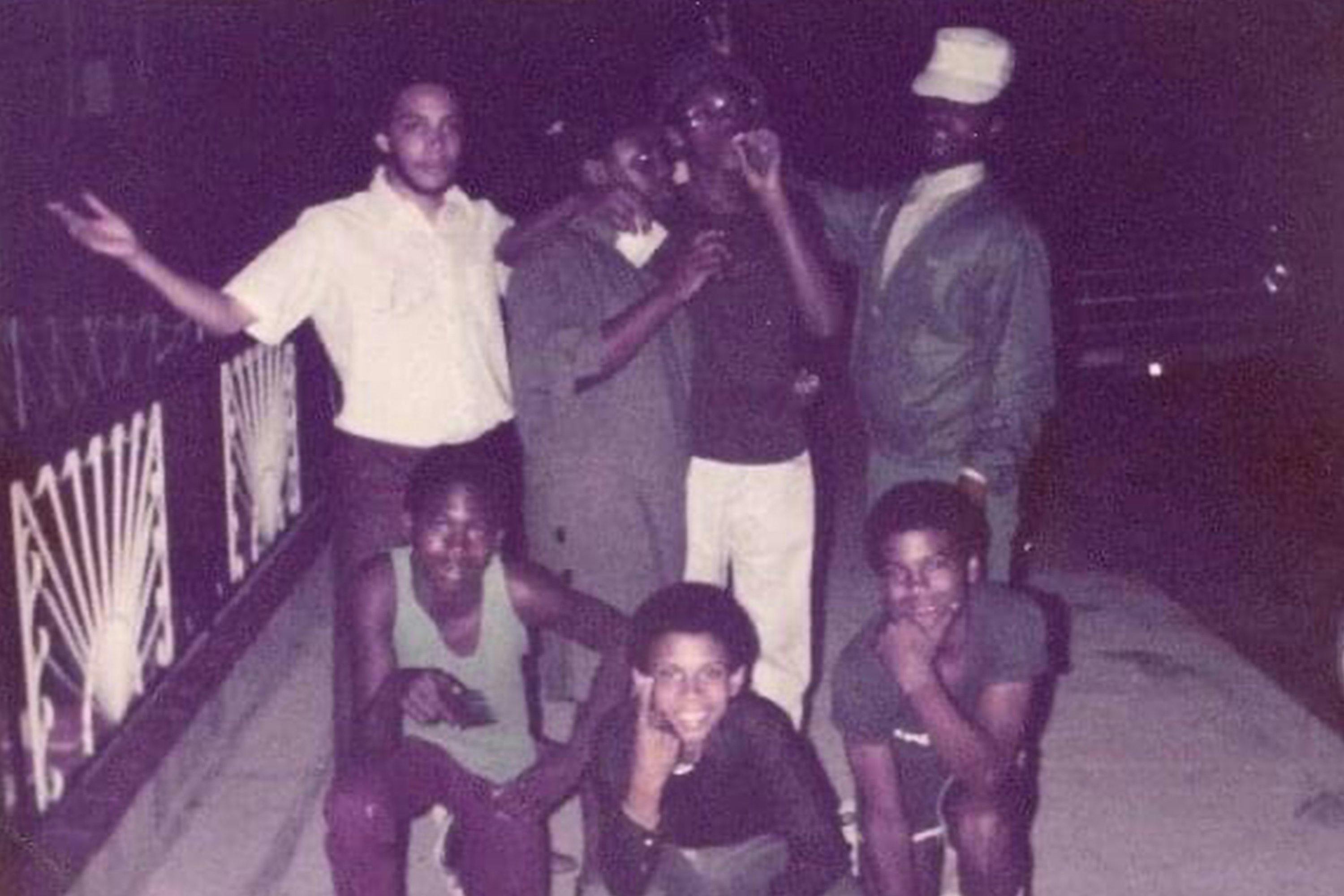
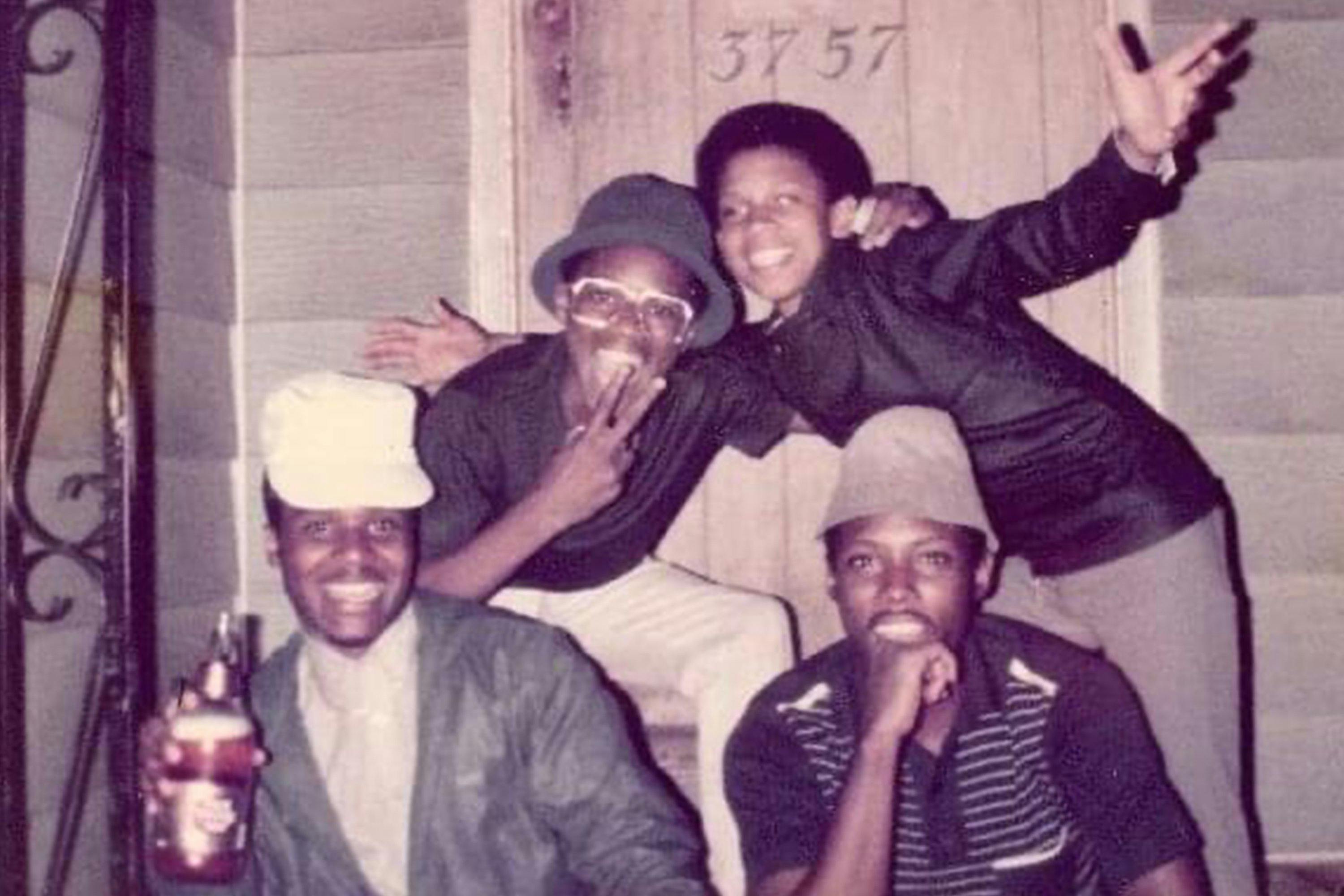
Photos: Phil Jean-Remy
LL COOL J (James Todd Smith, born 1968): I was the first generation to grow up on Hip-Hop. The very first Hip-Hop I heard, at around 8 years old, was probably the Cold Crush. That was on a tape. This was in Long Island, because I used to go back between Queens and Long Island every summer. The guys in Long Island, they would bring the Cold Crush tapes in because a lot of those guys had family in the Bronx, they had family in Brooklyn, they had family in other places, so they would go home. It just so happened that my next-door neighbor had a lot of foster kids. They were from all over the city, so I got exposed to stuff from the Bronx and Brooklyn; I’m hearing Staten Island — Force MCs. I’m hearing all of this stuff that nobody would hear probably if they weren’t next door to this particular house. So I kind of got locked in. I grew up in Queens, that’s true, but my first exposure to it was out in North Babylon, Long Island.
Royal Rich (Rich Romain, born 1970): It was 1977. My older brother was more hip to what was going on in the street. I can’t remember if it was my brother playing Hip-Hop on the radio or if it was someone walking down the street playing Hip-Hop on the radio. I knew I liked it. From what I know about the history, it started in the Bronx, and it hit Queens last. When I first heard about it, I didn’t know about the people from the Bronx. I just knew that people was talking in harmony on top of the beat. Shortly after, one of the first groups I remember hearing about was Grandmaster Flash and the Furious Five. This was [where I grew up] in Springfield Gardens [Queens]. One of the first rap acts I saw was a group from Queens called the Clientele Brothers. They consisted of Eddie O.J., Will Seville, Mikey D, and DJ Mr. Gene.
Dr. Butcher/Jazzy Drewski (Andrew Venable, born 1969): In ’76 to ’77, which would put me somewhere between 7 and 8 years old, I lived around so many DJs. I had DJs upstairs from me. My best friend who lived across the street from me, his brother Stanley was in a group with DJ Polo called Spinmasters, which also included a veteran MC by the name of Ronnie Gee, who made one of the first rap records as well called “Raptivity.” “Raptivity” was sampled by many people — just the intro where he says, “Warning: the Surgeon General of Chilltown, New York, has determined that the sounds you’re about to hear can be devastating to your ear.” He would always say, “Kool Moe Dee ain’t got nuthin’ on me! Melle Mel ain’t got nuthin’ on me!” He was always big on himself, in a good way. He’s a cool dude. I spent a lot of time in Brooklyn, because I lived in Brooklyn before I moved to Queens. A lot of family on my dad’s side still lived in Brooklyn. So I would spend a lot of time in Roosevelt Projects with my cousins. You had a lot of DJs on that side. They had equipment, and they were older than me. It was the thing you do. Everybody had turntables and things like that. I was just around it everywhere I looked. So anywhere you went — you go in the backyard playing music, the schoolyards. You have Disco Twins, King Charles. All these legendary names. These guys were in the parks blasting. Who had the biggest system? It wasn’t necessarily about the best DJs, but who had the best system. So when they would play you could hear the music for miles. It was insane. They had these big speakers called Berthas, they were probably 12 feet tall. The sound that came out of them traveled throughout the whole neighborhood.
Cut Creator (Phil Jean-Remy, born 1966): In a lot of ways it was like walking. You just started doing it without being cognizant of what it actually was. I would have to be about 11, I would guess. That’s when DJs would have jams that they called in the parks and stuff. My sister and I would sneak out and go to a local park, and watch the DJs. That’s when I first got my bug. That would be ’77, ’78.
Dr. Butcher: I couldn’t go to the parks because the violence was crazy. My mom let you know that she would not allow me to go anywhere but sit on the stoop. I would sit there and listen to everything I could. But I was lucky to have DJs above me — these guys called The Earthquakes. One of the DJs was really good. So I could just sit in my living room and listen to those guys all night long and just pretend I was DJing with them. I think one Christmas my mom bought me a mixer. No turntables. I would just plug it up and turn it on and off, and that was good enough. I was DJing! [laughs] So that was my early years being exposed to it. It was the hot thing to do, or listen to at least.
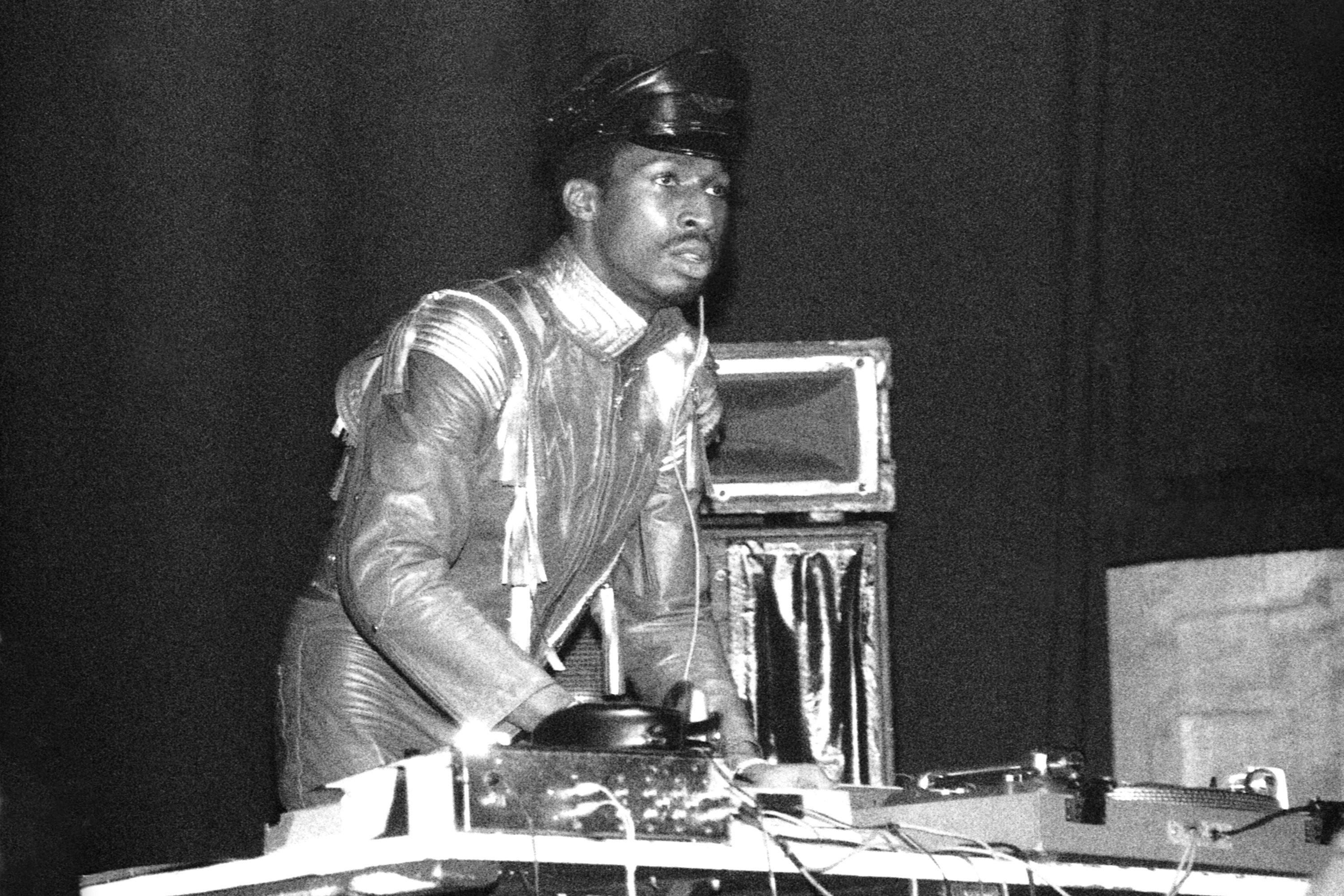
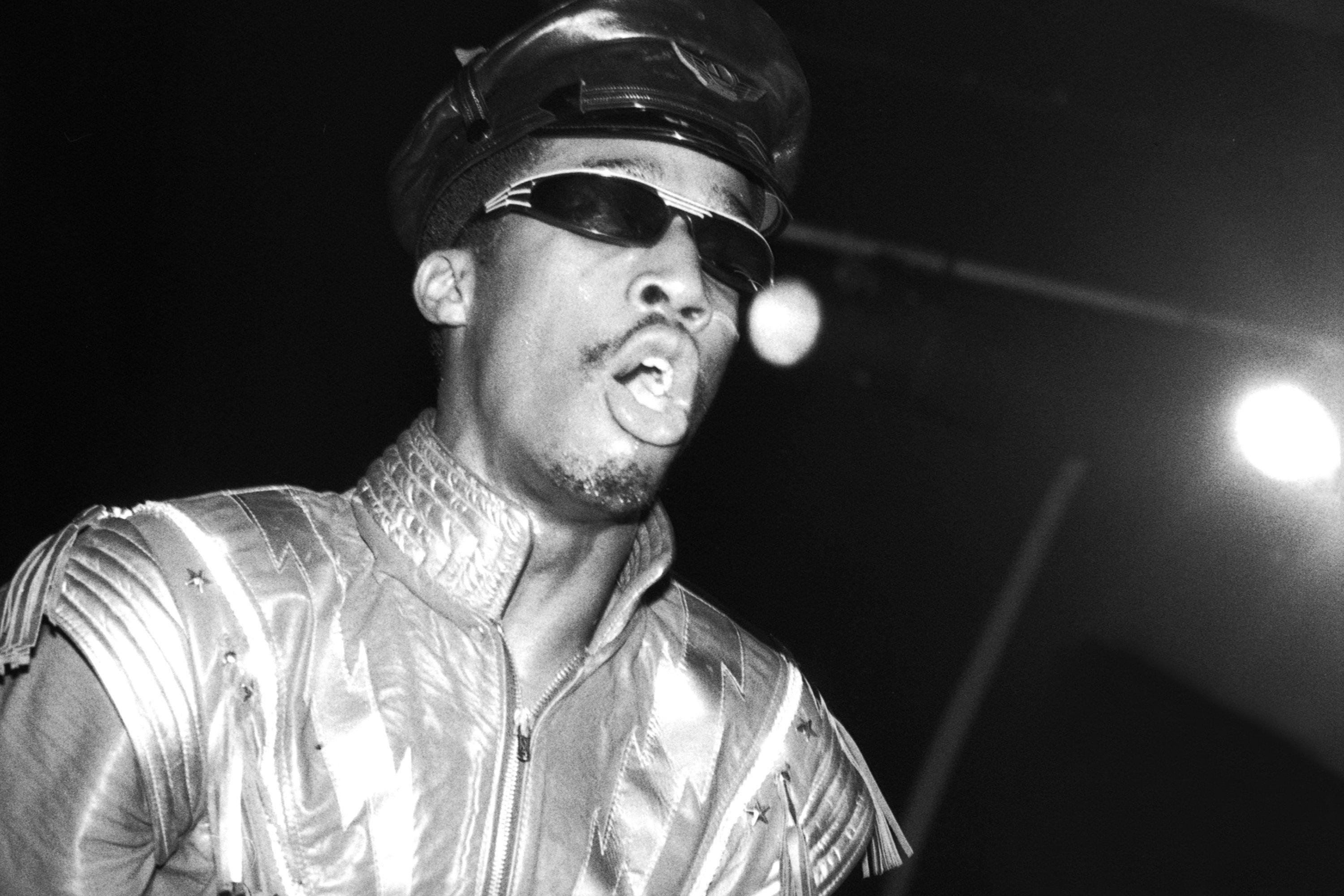
Photos by David Corio/Michael Ochs Archives/Getty Images
LL COOL J: The older guys used to get me to say other raps and say other things that people say, just because they liked the way my voice sounded when I said it. “Yo, say that again! Say that again! I like the way your voice sounds.”
Royal Rich: I had always liked music, but I knew I couldn’t sing. So when I heard guys talking over a beat, I said, “Wow, I could do that!” I finally found a way that I could do what I liked listening to. I could talk over a beat.
Dr. Butcher: I did both [MCing and DJing] in tandem, mainly because there was a guy who lived above my first cousin, Vinnie. We called him AC Vinnie B, and Vinnie had turntables. Vinnie suffered from an extreme case of asthma — so much so that he was always in the hospital. He would never go to school. So he was pretty much homeschooled. His mom got him a set of turntables. He was my first direct access to somebody letting me touch their turntables and really have fun with it. He was a rapper, as well. He was probably the best DJ I had seen at that time. He was the fastest and the most on-point DJ I had come across. He was an avid reader and an avid writer. He had a lot of time on his hands. He would just sit in his house, read books, and write rhymes. There was about three or four of us, an, he would just write stuff for everybody. When I couldn’t DJ, his brother was the main DJ, and I would have to sit down and work on the routine with these guys and learn the routines and kind of start rapping. It was mainly because my dad wasn’t trying to buy me a set of turntables and my mom couldn’t afford it. So I got to writing and spent more time MCing. I had skill in this so I kept on honing my craft. Vinnie was really good, just a really smart guy, so just the wording he was using was outside what the normal guys were using. That helped me open my eyes to a lot of things when I started sitting down and put the pen down.
Cut Creator: It was cool, man! I was always drawn to the DJs as much as watching these cats on the mic. There was a lot of fun behind it. I guess I always wanted to be a DJ. My mom was a single mom. She didn’t have enough money to buy those for me, so what she did was on my 14th birthday she bought me a mixer, sans the turntables [laughs]. What I would do is look at this mixer every day until I got a summer job when I was 15, and I bought my first set of turntables then.
LL COOL J: I liked Melle Mel, Treacherous Three, Fearless Four, Crash Crew, Furious Five, the Cold Crush. I liked all of them groups. I was a student — doctorate dissertation level. Kool Moe Dee was absolutely one of my favorites.
Royal Rich: I would say [my biggest influences were] Kool Moe Dee and Melle Mel.
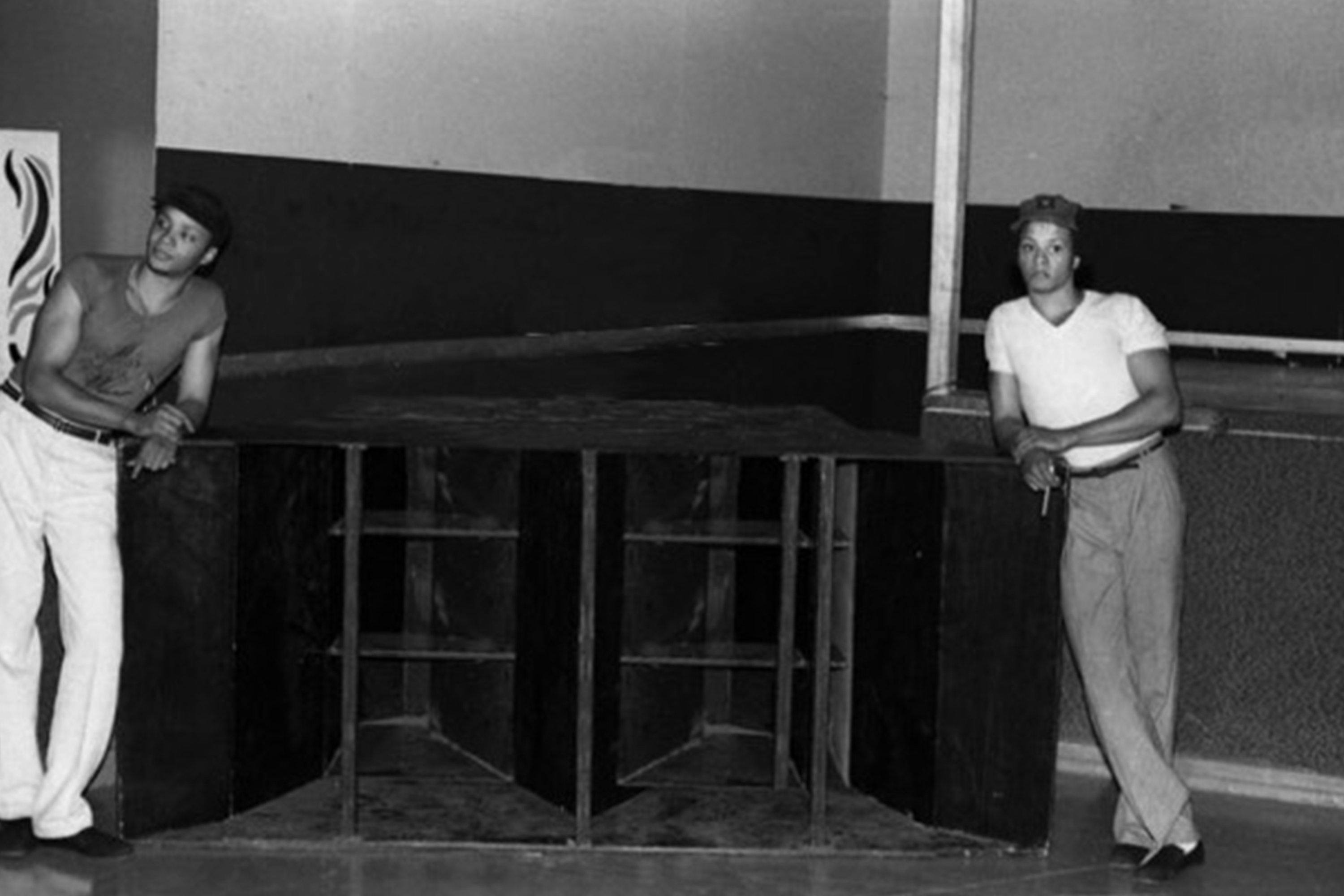
Photo: Disco Twins
Dr. Butcher: I would say [my biggest influence was] Vinnie. It first started with Vinnie. A guy from the Spinmasters — Jap 10 — he was someone I always liked to be around. And then on the records, Treacherous Three, the standard crews. Spoonie Gee was a favorite of mine. I loved the Fantastic Five — Dot-A-Rock and those guys. And then the Fearless Four. The Fearless Four changed things for everyone. They ushered in that new school of lyricism. But like I said, Moe Dee and all those guys and Cold Crush. Those were the best of the best at the time, so that’s who everyone listened to and everyone was inspired by them.
Cut Creator: At that time you gotta say Grandmaster Flash [was an influence], obviously. Caz, DJs from the Fearless Four, Treacherous Three, all those cats. You kind of fiended to hear those tapes. There were a lot of local DJs who actually influenced me more because they were within my immediate proximity. My next-door neighbor, he was part of a DJ crew [The Spinmasters], and I would watch them bring their speakers out and throw jams in the backyard. I’d be the young kid starving to get on the turntables then.
LL COOL J: First I want to say that I was Rapper T, then it was MC Deluxe, then after Deluxe I had a minute where I dabbled with the Five-Percent [Nation] so I was like Lord Supreme for a minute. Then it was J. Ski. Lord Supreme and J. Ski were kind of side-by-side.
Royal Rich: My first MC name was Richie D. Then at one time it was Richie Devastate, because when I called myself Richie D, the D didn’t actually stand for nothing. I had gotten that name from a friend of mine who was a rapper at the same time, and his name was Dexter D. I was looking for a name and when I found out his name was Dexter D, I put a D on the back of my name. The D didn’t have a meaning so I had to give it a meaning I felt at a certain time. And at one time my name was Disco Ace.
Dr. Butcher: I was Jazzy Drewski. Everyone started calling me Drewski, and it stuck. [laughs]
Cut Creator: The first crew that we formed was the Jelly Jam Crew, and my name at the time was just Philly Phil. I ended up adopting Cut Creator, so I became Cut Creator Philly Phil after that. I was Cut Creator a couple years prior to even meeting him [LL COOL J].
Royal Rich: I had come up with the name Rich Little that I had gotten from the comedian that used to impersonate other people. At that time a lot of people had a slogan before their name, so I came up with Royal. So I was Royal Rich Little. I always felt a little funny because the name I came up with was named after somebody else, so I dropped the Little. And that’s how I came up with Royal Rich.
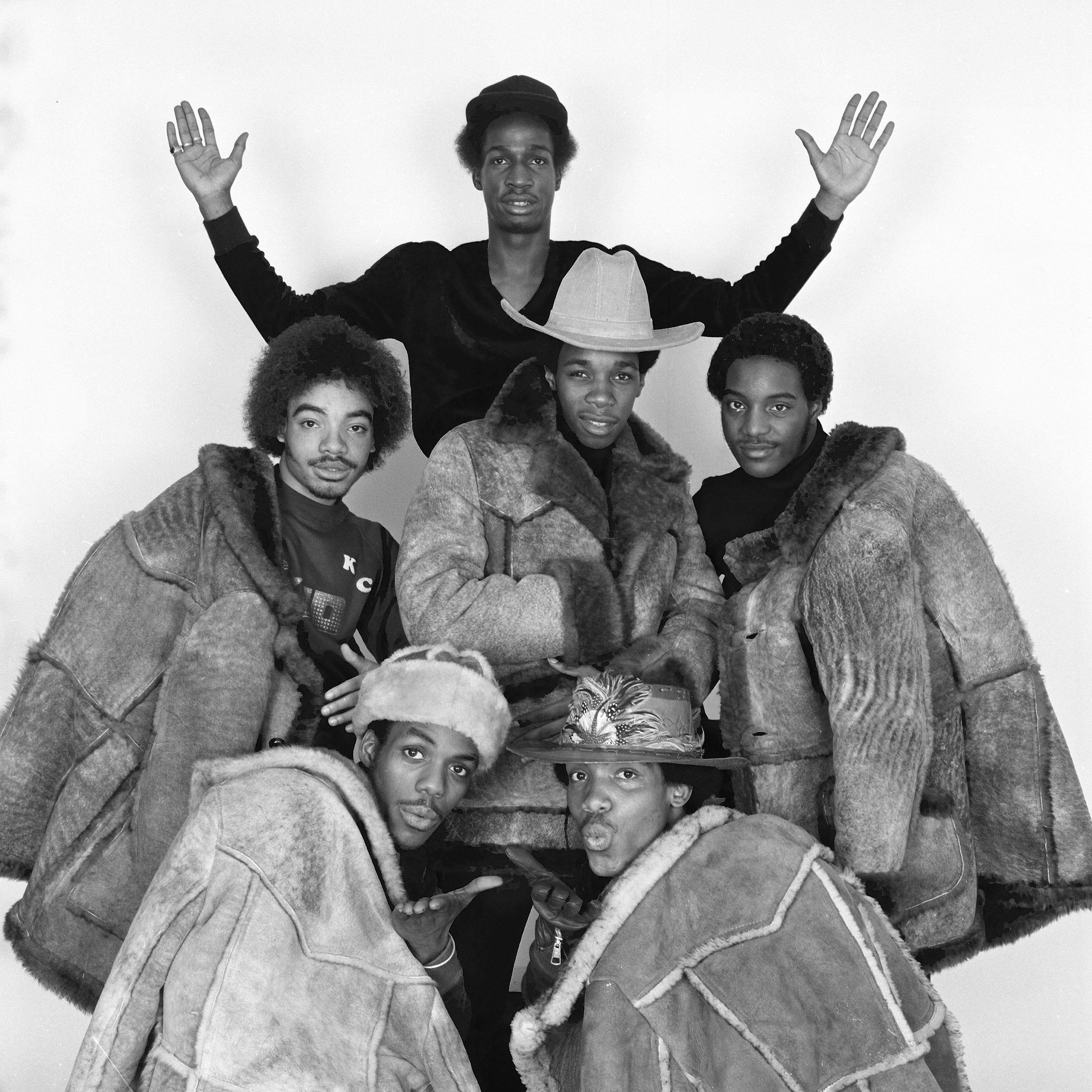
Photo by Anthony Barboza/Getty Images
LL COOL J: And then I changed [my name] to COOL J. The way that happened was one of my other rap partners at the time that I used to rock with was Playboy Mikey D. Because he was Playboy Mikey D and we like the girls and all that, I said, “I’m Ladies Love Cool James.” He was Playboy Mikey D and I was the Ladies Love Cool James. When I got with Rick [Rubin], we just made it LL, because we thought it would be too long for the record label.
Dr. Butcher: Cut Creator had moved into my neighborhood. He lived directly across the street from me. Him and his sister and his mom. Me being the nosy kid on the block, I was just sitting on my stoop and I noticed this guy was moving a certain way. He had his set up in front of the window. I was like, “Is this guy DJing and I can’t hear music?”
Cut Creator: I had just moved onto the block. I didn’t have turntables when I first got there. I would use my mom’s console that had one turntable and just try to learn how to scratch records on that. One day I hear a knock on the door and this little kid is there and he’s asking, “Do you wanna mix?”
Dr. Butcher: He always tells the story where he opens his door and there was this little kid standing there with a big afro, chewing a big mouthful of bubblegum, like, “Hey! You wanna cut?” He was like, “Who is this little dude?” But he invited me in and he had his setup, and I just sat there watching him do his thing. He was really good. I mean as good as Vinnie. In my mind, Vinnie is the best that I had seen. But there was the Disco Twins and they were considered to be legends, because those guys were battling Grandmaster Flash and things like that. So they were like the celebrities of the neighborhood. As far as one-on-one, Vinnie was my guy. And then seeing Cut Creator, it’s like, “Dude, this guy is nice, too.”
Cut Creator: From there, he and I formed a friendship and that’s how we rolled.
Dr. Butcher: He kind of took me under his wing. It was just like a party house between my house and his house, and we all would congregate at each other’s homes on a daily basis. His mother was very cool as long as everyone’s homework was done and people weren’t acting crazy. My mom was the same way. She didn’t mind. It just gave us a safe haven to go and have fun and be creative.
Cut Creator: We would always be rhyming and stuff at my house. It was the nexus. Everyone was always there. Kool G Rap was one of the people there, he was part of that crew. This is before he was Kool G Rap, obviously.
Royal Rich: There was a Hip-Hop talent show that was gonna go on at August Martin [High School] where Drew was a student, and my sister went there also. So my sister said to me, “Why don’t you go and audition for the show that’s gonna take place at my school?” Although I didn’t go to the school I said, “Sure!” because I looked at that as exposure.
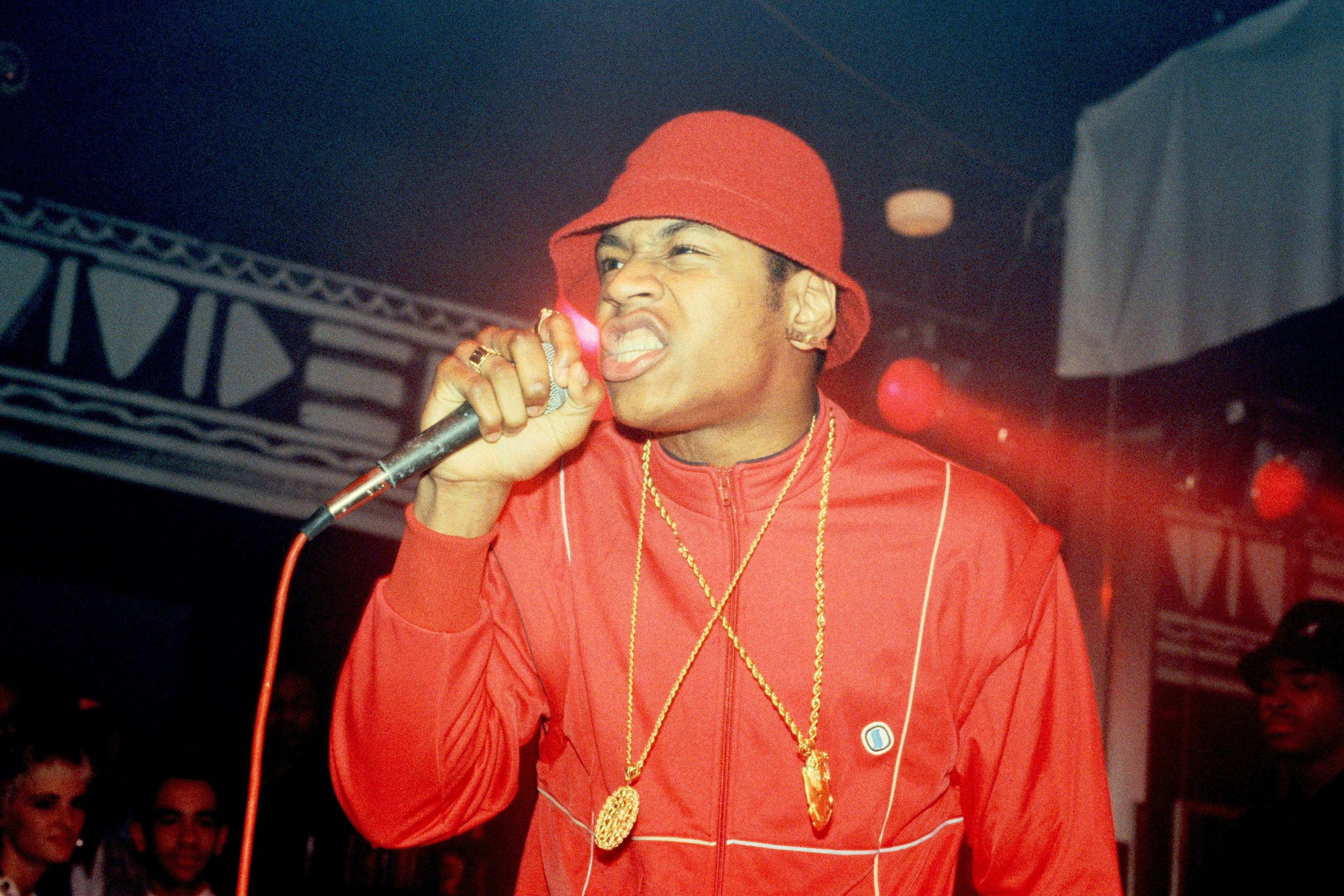
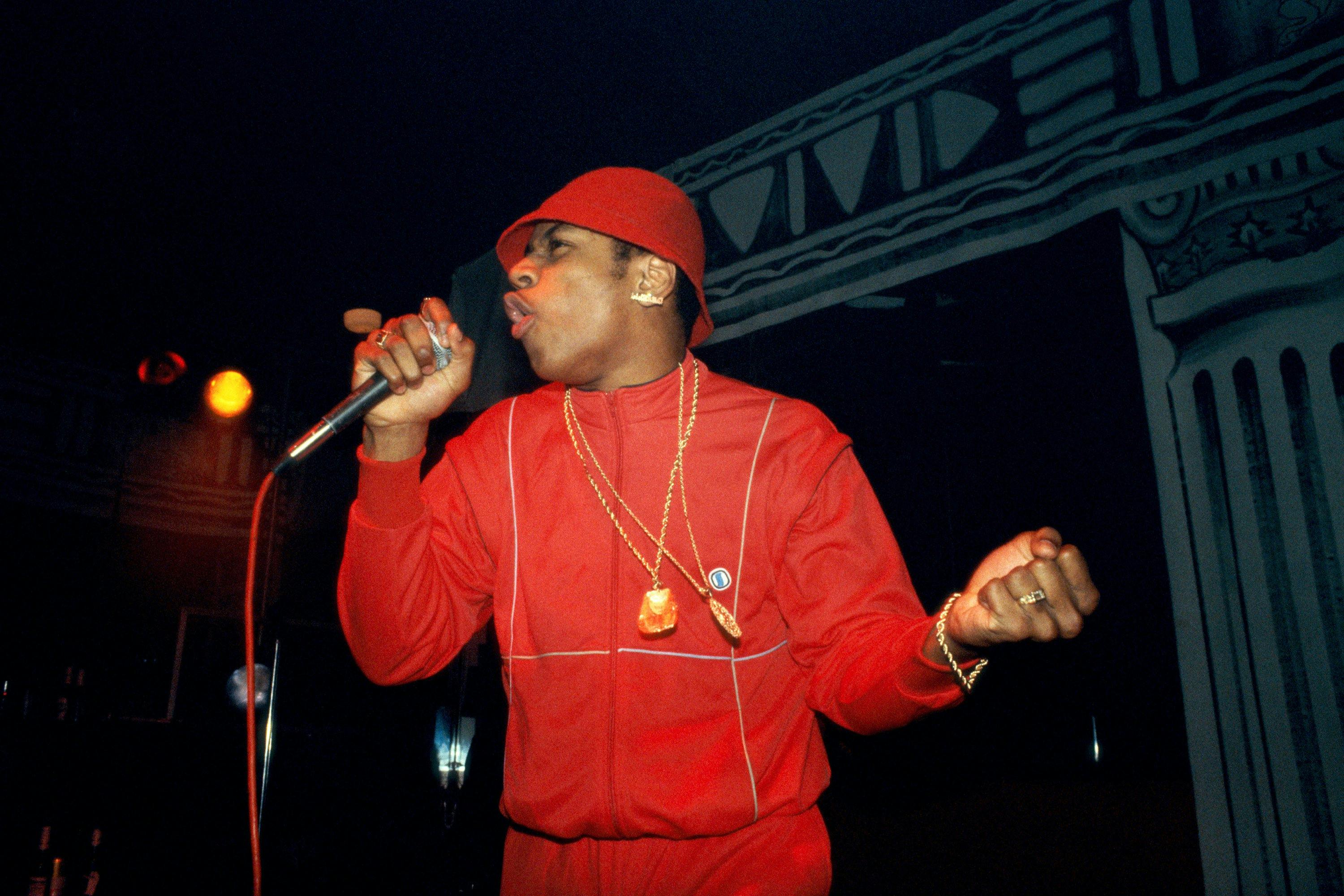
Sony Music Archive via Getty Images/Terry Lott
Dr. Butcher: There was gonna be what they call a “Rap Attack.” It was this performance they were gonna put on. I met Mikey D, who was performing with a guy named Snow and another guy named T [Loverboy TC].
Royal Rich: LL was going to be in that talent show. Everybody who was supposed to be in the show had to come to the practice. Mostly all of us who was in the show, we had gotten to know each other because we saw each other at least once a week leading up to the show. Some of the guys used to always rap in front of the school before we go into the school to practice. LL definitely was one of the ones that used to share his rhymes. People used to circle around him to listen to his rhymes.
LL COOL J: We were just like-minded young kids hanging out.
Royal Rich: Mikey D, who also lived around the way, he wanted me to battle Drew. He said, “I got this guy I want you to battle.” I wasn’t one to back down from a battle. So I said, “OK, I’ll go there and I’ll battle him,” not knowing that Mikey D told Drew that he got somebody that he wants him to battle, which was me. So Drew was expecting me to battle him and vice versa. I was going to the school with a friend of mine named Loverboy TC, who was also down with Mikey D. I told him that I’m about to battle Drew when I get to the school.
Dr. Butcher: And he [Loverboy TC] brought him [Royal Rich] up there for us to battle, and we just started exchanging verses. I was impressed with him, he was impressed with me, and everybody’s all, “Y’all should be a group. Y’all are nice.” And I go, “Hey, I agree.” He was the first guy my age who I had met that was as good as me and he felt, “This guy is good as well.”
Royal Rich: We [Drew and myself] formed a group called the Extravagant 2. I named it.
Dr. Butcher: LL was there, too, with this guy he was close with named Max Mellow C. And they were in a group.
LL COOL J: I was with my man Cal [aka Max Mellow C], and we dressed up all crazy, had these crazy uniforms, and the curtain opens momentarily, and the crowd started going crazy and kind of laughing but kind of shocked. And then it closed back and then it opened up.
Dr. Butcher: LL was so impressed with me and Rich. He was like, “Yo man, when this is over I want us to form a group.” I was like, “Yeah, let’s do it.” The show ended and we just joined forces and became the Extravagant 3.
Cut Creator: [At my high school Brooklyn Tech] I had a side hustle taking Regents Exams for failing students. I got caught at the end of my junior year.
Dr. Butcher: My mom had to go to the school to get him out because they were gonna suspend him. If his mother would have went there she would have killed him. So he called my mother to come get him [laughs].
Cut Creator: I had to leave Brooklyn Tech and transfer to Christopher Robin Academy.
Dr. Butcher: His [LL COOL J’s] grandmother put him in a private school called Christopher Robin. Cut Creator attended Christopher Robin as well, and so did Fashion from the Beatnuts. I was telling him [Cut Creator] about him [LL COOL J]. “Yo, there’s this kid L. He’s incredible. You have to hear him.” So I talked about him for months, then when he got to the school he couldn’t stop rapping. Everywhere he go, he’s rapping. So when Cut Creator came home one day, he’s like, “Drew, can you describe that kid that you told me about who never stops rapping? By the way, is his name James and he’s a tall, lean dude that always wears Kangols?” I said, “Yeah, that’s him.” I called him, and it was him. Just from my description he recognized him. That has to be the same guy. So that’s how all of them met.
Royal Rich: When LL got down, Cut Creator had got down at the same time. It just seemed like a natural thing because him and LL was close, and him and Drew was close.
Inspired by their favorite MCs of the time, the newly formed Extravagant 3 sought to expand on what they dubbed “The Educated Style.”
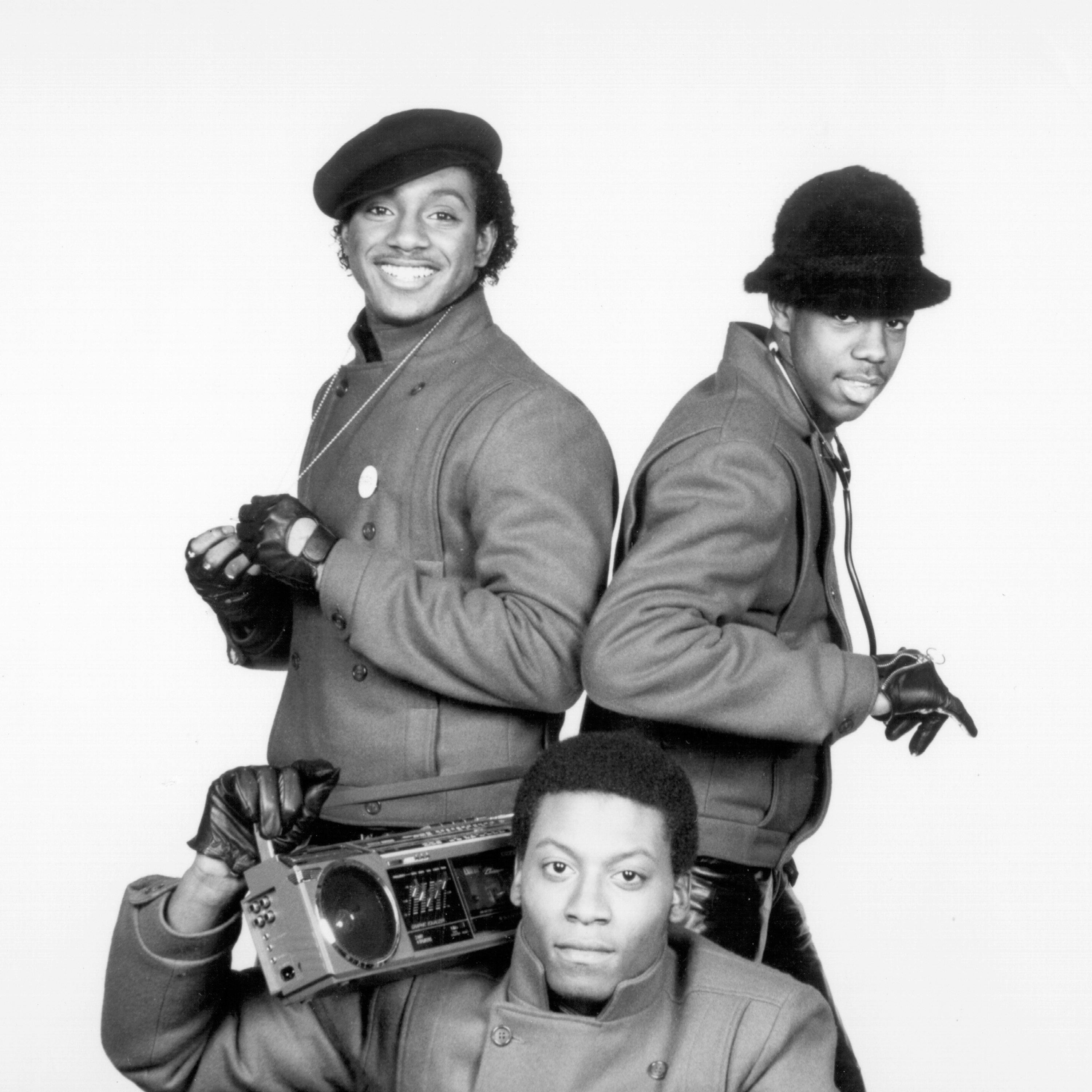
Dr. Butcher: I guess The Educated Style would be considered those who were using big words at the time. UTFO — The Educated Rapper — he was doing it. T La Rock came out. Special K was kind of writing his lyrics. So Kool Moe Dee and Special K were big into that as well. We all fed into that and were doing similar things. The trick is you have to keep it where the people can understand what you were still saying. You don’t want to pull out these ridiculous words out of the dictionary and no one knows what you’re talking about. That makes no sense either. You would try to find slick little words here and there that just weren’t your typical “Hip-Hop, bebop, shibby di bop” stuff. You wanted to kind of take it to another level.
LL COOL J: We all learned from each other. Stylistically one of the things you find with MCing is that wherever you’re at, there’s a general vibe of how people rhyme and you take that general vibe and roll with it. They’re like parameters almost. You kind of do your own thing.
Royal Rich: Our style was slightly different, but we were kind of on the same page. I didn’t think about it much at the time, but I kind of knew that LL also liked Kool Moe Dee and Melle Mel and rappers like that. Grandmaster Caz. I could tell that Drew liked them as well. We all had something about our styles that distinguished us from the other one, but we were all kind of on that big-word-vocabulary-type-of-way of rapping that was inspired by Kool Moe Dee, in particular.
Dr. Butcher: We were very close, and I think that’s why we all gravitated towards each other — because the styles were very similar, L being the most advanced of the three of us, I would have to say. He’s definitely a wordsmith.
Cut Creator: Drew had not really an aggressive style, but a very focused style. Royal Rich tried to go the more intellectual, message-based rap. And COOL J, I would say James emulated a lot of Kool Moe Dee by using a complex vocabulary in his rhymes, and he always had a good ability to put those together in a significant way. Drew was more in battle form. Rich was more always trying to get a message there.
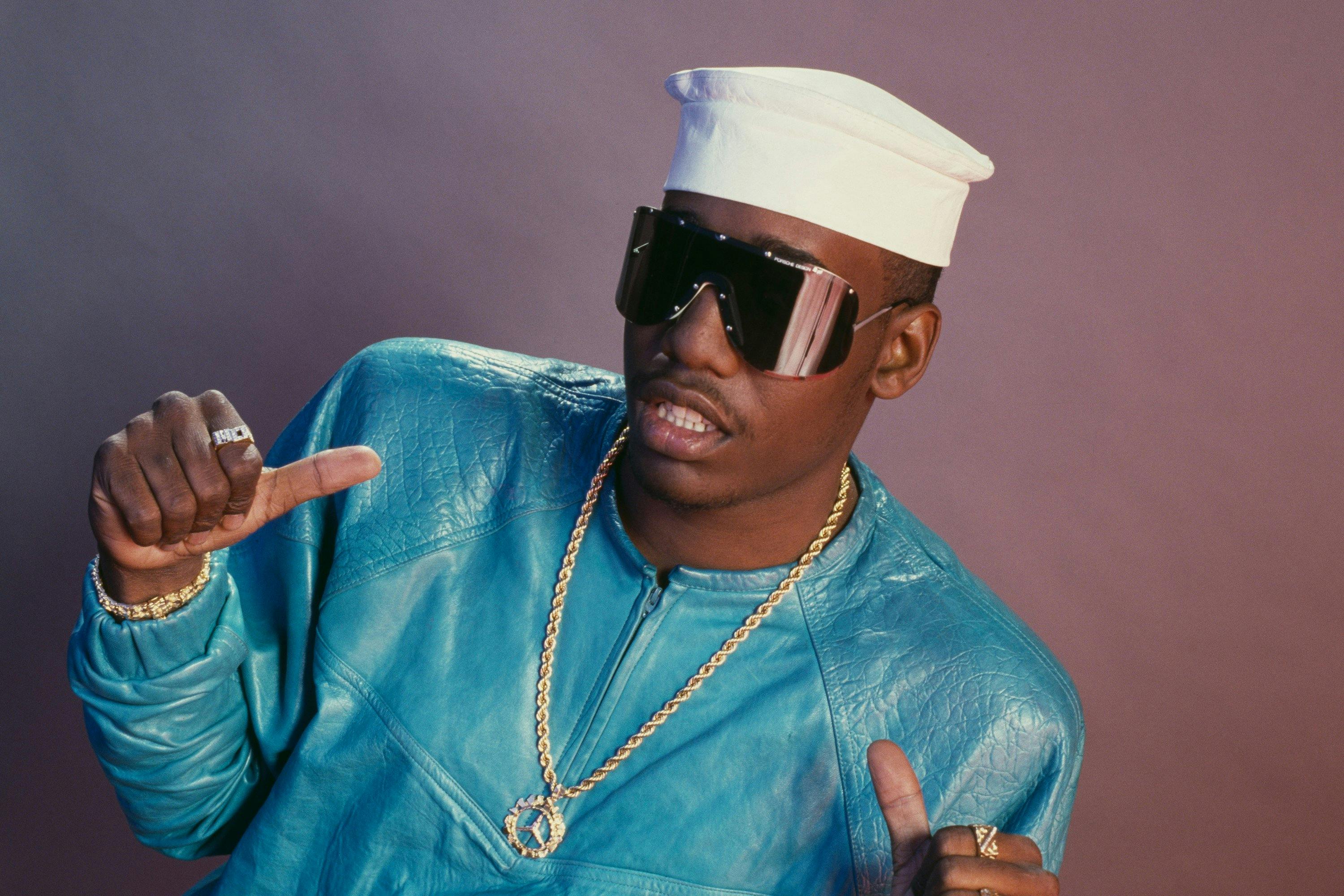
Photo by Michael Benabib/Michael Ochs Archives/Getty Images
Dr. Butcher: It felt like the dude [LL COOL J] read the dictionary inside out, like he had it memorized inside out, because just as a 14-, 15-year-old, the things he could pick up and just throw at you, it wasn’t just normal things that people were using. He was more advanced on the wording side, but for me and Rich — I would say cadence and flow — we had a lot going on there.
LL COOL J: I fell into a quasi-leadership role in the group, but not official. It wasn’t like I was the official leader or something, but the guys kind of would be like, “Yo, we were thinking about this routine. What do you think?” and they would kind of defer to me on certain things.
Royal Rich: He [LL COOL J] was super-determined. I remember one day he said, “We gonna practice after you get off from school. What time do you get off from school?” I think I said three o’clock. So when I came home, I came straight from school because I knew I had to meet him at three. I was a little late. I think I got here at 3:15. So when I walked in the door, who did I see sitting in the living room? I see LL. I was like, “How did you get here?” He said, “I was here at three, and your mother answered the door and she let me in, so she told me have a seat and you’d be here in a few minutes.” And right there I said, “This person right here is about his business.” Mind you, I was only 13. I met somebody else who was just a few years older than me that wasn’t playing with this thing. The way he is now, he was always like that when I met him.
Cut Creator: James [LL COOL J] was a little flamboyant, and at the time a little awkward, I guess. Because our crowd was awfully raunchy. Very confident in ourselves. I would think that he’s not sure he actually felt he was of that particular caliber at that time, although he actually was.
Dr. Butcher: When I first went to his [LL COOL J’s] house in his basement, the first thing I noticed was 20 garbage bags spread around his room and they were all filled with loose-leaf paper, filled with rhymes. He wasn’t a typical rapper who would just spit a verse. L would go through each bag and snatch out a piece of paper, and he would say one verse, snatch out another piece. and connect the verses. And he would do that with all of his rhymes. So he would never spit the same verse on the same format because in his mind he had them all jumbled up. So they could come out 10 different ways. You never hear the pattern the same exact way every time he said it. You may know pieces of it, but you don’t know all of it because he was mixing them all up. That was pretty unique. I had never seen anyone do that before.
Cut Creator: Drew was always energetic, loyal to the core. Rich was always very laidback. Very reserved. He was always into music. Drew had a very distinctive style. He flowed very well. Rich was actually very good.
Royal Rich: He [Drew] was definitely an optimistic type of person, definitely somebody that loved Hip-Hop and just was happy to be a part of it.
LL COOL J: We used to work really hard. We had a lot of routines. [We’d] analyze rap. It was like being in college. It was like being in school. Our whole world, everything revolved around, “Did you hear what he said?” or “What she said?” or “What they said?” Rhymes and everything about it.
Royal Rich: Sometimes we would practice at my house, sometimes we would practice at Drew’s house. We could have even practiced at LL’s house, and a lot of times we even practiced on the phone.
LL COOL J: Royal Rich’s brother [Ray Romain] played the keyboard. We used to call him Professor KB, because he played the keyboard and all that.
Royal Rich: My brother also used to be into beat programming. Being that we was rappers, sometimes when we would practice at my house, it was just natural that he would do the music for us. He would play a beat, and then play a tune on the keyboard. We would make tapes like that. The drum machine that he had at that time, it really wasn’t a drum machine that you could program beats. The beats were already preprogrammed in the drum machine. It was called a Korg 55B.
Dr. Butcher: We had Professor KB and Dr. Rhythm — a guy named Leonard. We called him Dr. Rhythm and he had drum machines. So he was the programmer. He would program the beats, Ray would play the keyboards, and we would just rap the routines to whatever they came up with. Cut Creator, at times we would go to his house and do the same thing, and he would scratch over the top of the drum machine and keyboards. The record that he would use was Richard Pryor where he says, “I want a cut!” He had a joke talking about selling sex and he was like, “If you do, I want a cut!” Cut Creator took that and used that as something he would normally put in routines if we were rapping over drum machines. He would scratch that piece of Richard Pryor, and then years later LL used that in “Go Cut Creator Go,” and Bobcat was scratching that piece from the Richard Pryor record. Because I think L remembered that’s what Cut Creator used to always use.
Cut Creator: I wasn’t an official part of the crew, but I mixed wherever there was opportunities.
LL COOL J: We had this joint over the “Numbers” beat [by Kraftwerk]. “Our shit is crushed!” [Hums “Numbers.”] “Our shit is crushed!”
Royal Rich: We probably used the staples like “Dance to the Drummer’s Beat” [by Herman Kelly & Life], “I Can’t Stop” [by John Davis & The Monster Orchestra], “Funky Penguin” [by Rufus Thomas]. Stuff like that.
Cut Creator: “Catch a Groove” [by Juice], “Impeach the President” [by The Honey Drippers]. It would go the entire gambit. Every stereotypical break you can think of we’d pretty much play.
Royal Rich: “It’s like a Hip-Hop shuby, I wear the ruby, to Bo and Luke Duke I’m super and groovy. Ladies of the county I am certainly known to be the waterbed wizard of the female’s home.” That was one of my rhymes. I was 13.
Dr. Butcher: I don’t remember full rhymes, but I know he [LL COOL J] would say stuff like, “I possess many powers you may not think of, I can even dial a telephone with boxing gloves. I’m the king of espionage, double-L COOL J, in fact I got back with the CIA.” He was pretty intricate with lyrics. I would say stuff I won’t even remember. “Rhyme conductor not soprano, on the mic or the piano, am fin de la fiesta yo recibo mucho mano. Top designer quality just Gitano, and I don’t eat Wonder but Drew Italiano.” I remember one routine we had called “Rock Rock.” I can’t think of the words.
Royal Rich: He [LL COOL J] used to have this rhyme. It always sounded funny to me back then, but he said it was so much enthusiasm and passion. He said something like, “If Mona Lisa’s name was Teresa, I’ll get a piece a, of Mona Lisa do-re-mi-fa-so-la-ti-do, and Italiano, rhymes are so fresh it’s bravissimo!” When he made that record “Dangerous,” which was his second record, there was a part on that record where he said something like “I’m numero uno, amigo with an ego, je pan de la Francais and Italiano.” That and maybe one other rhyme he put on a later album.
Dr. Butcher: I had adidas and Lee suits to match every pair of adidas I had. If I had light-gray Lee suits, I had light gray Adidas to match. Anything I wore, I had to match the sneakers. I think LL was the same, Rich was the same, we all pretty much dressed exactly the same. Phil would wear denim with Izod T-shirts and Kangols. I didn’t wear hats. LL always wore a Kangol. At one point in time he was wearing Jheri curl underneath the Kangol [laughs].
Cut Creator: adidas, Lee’s. My particular style would have the adidas, the Lee’s and a matching cardigan sweater, and a Kangol. Outside of the cardigan sweater, you could pretty much copy and paste that on everybody [laughs]. The status quo. He [LL COOL J] was rocking the Kangol.
While on the quest to get the Extravagant 3 a record deal, they met up with producer-manager Hurby “Luv Bug” Azor, who would soon have great success with Salt-N-Pepa and Kid ’n Play. LL COOL J also befriended Silver Fox (Reggie C. Hobdy Jr.), a Harlem rapper from the group Fantasy Three that was on a tiny label called C.C.L. Records operated out of the store Manhattanville Records.
LL COOL J: We were always just kind of a group that was writing. A group in development. A group trying to make it, meeting with people. We met Hurby Luv Bug in, I don’t know if it was Corona or Elmhurst. We’d go meet Hurby in the basement. Drew introduced me to a whole ’nother side of town. He introduced me to a lot of people in that area. Me, Drew, and Rich, we was running around trying to make this thing happen. All over the place, trying to get down with people, trying to get them to be a part of this thing, trying to get down with other groups, trying to get them to believe in us.
Dr. Butcher: One day just sitting at L’s house, doing what I said we’d do, reciting records and pretending to be people we weren’t, we came across the Fantasy Three record. He put it on, and we were looking at it. No one had record deals, so people sometimes would put their numbers on the labels. We looked and was like, “Yo, the number’s here!” He’s like, “Yo, let’s call him.” We didn’t expect anyone to answer.
LL COOL J: They [Fantasy Three] had that record “It’s Your Rock.” I called the record store because I was trying to get the record label, but the record label was just a phone number at the store. Silver Fox worked at the store.
Dr. Butcher: It was just luck of the draw. We dialed the number, and Fox picked up. He said, “Meet me here on this particular day.” We were like, “Really? This dude wants us to come down?” So we were all excited and hyped up. We agreed to meet at my high school, August Martin. Rich showed up and we sat out there till about 6 or 6:30 at night waiting for L, but he didn’t show up. Then later that night when we all got home we called him, and we finally got him on the phone. He’s like, “Yo, I’ve been looking for you guys!” We were like, “Dude, we were on the front steps. We missed each other, but we were there waiting for you.” But he ended up going down and meeting Fox anyway.
Silver Fox: Well he didn’t really call. He just came to the store. “Hey what’s up? I’m LL COOL J, and I want to get signed to a record label.” I was like, “I’m Silver Fox. What you got?” He started going off with his verbals. I was like, “OK.” We sat and talked for a bit. I was trying to introduce him to the people of my group — Charlie, Larry, Chico [Julio Guina] — and let them know that this young man is pretty good. He was about 16. Now you got to understand the time frame. Everybody that was doing rap were older now. They were the old vanguard of rap. The Treacherous Three were older than that. They were 25-, 20-somethings. Caz and everybody else. So here comes a 16-year-old, and the door is closed for the younger generation. It didn’t make sense to me, because it’s their time and they need it.
LL COOL J: I used to go down to the store. It was owned by a guy named Julio Guina. We was just all artists, MCs that just loved the art form. We would just sit around talking about MCing all day, write rhymes, talk shit about rhymes, and it was just exciting. Fox used to take me and try and get me down with Julio who owned the record store, but was like, “Ah, he’s just another rapper! I already have you guys [Fantasy Three]. What am I gonna do with another rapper?” Fox was like, “I’m telling you Julio — he can do it!” Blah-blah-blah, and then, “He’s just another rapper!” He fucked that up [laughs].
Silver Fox: We sat and talked a little. I found him to be a personable young man and he kept coming [laughs]. He didn’t just come that one day. He came almost every day. I realized he was coming from Queens. I’m like, “Dude, you coming from Queens, you taking the train every day. You must think I’m somebody you want to see.” So we hung out.
LL COOL J: Silver Fox was my mentor in Hip-Hop and rap, and really taught me about cadence and flow and stuff like that.
Silver Fox: I was telling him about a better delivery, because sometimes you breathe and it can mess up everything else. I showed him how to breathe, and we talked about cadences. I said, “Hey, let’s hang out and I’ll take you places. We could go a few places together and see if I could get you on the mic.” I took him to Joe Grant’s.
Dr. Butcher: Fox would always perform at this spot in Harlem called Joe Grant’s. He [LL COOL J] would go there and check him out. Same thing with [Kool] G Rap. Then another buddy of mine that introduced me to G Rap was telling me, “Yo, this dude Fox is a beast.” It was funny because within the same week of them telling me that, LL had expressed the same. “Nobody can touch him. He’s way above our league. We can’t even touch him.” It was coming from the two dudes that I considered to be the best dudes, so I couldn’t question that at all.
Silver Fox: He hung out with me so much that he knew all my rhymes. That’s how prolific and smart and intelligent this dude is, because he can soak up his rhymes and mine. Now it sounded like we were doing a routine. Of course, I had his rhymes too. Every week we kept writing and that’s what kept us on-point. Because each week we would have to write so that by the weekend we’d go into Joe Grant’s and we would have something we’d know we were gonna say. We’d have it memorized. I’d jump in on words. So we start switching stuff up and changing the cadences, instead of it being a simple cadence. Somebody said something recently that rings true: You make your voice like an instrument. Like a percussion instrument, and that’s what a cadence comes from. He actually absorbed it, soaked it in like sponge-type.
Royal Rich: There were times when we [Extravagant 3] wouldn’t be doing anything because we would practice but there wasn’t never no show. It would be times when I guess we would kind of do our own thing. Somewhere around there, LL must have met someone that enabled him to get on a record or whatever, and then the rest is history.
Cut Creator: It was just life and attrition. I know that there was no angst amongst them [Extravagant 3]. But I don’t think there was anything cataclysmic that ended the partnership.
Dr. Butcher: There was never any dissention or any animosity. It wasn’t a bad breakup. Me and Rich stayed together. We was happy for him [LL COOL J].
Before The Extravagant 3 were able to get out of the basement. LL COOL J had already struck out with C.C.L. Records, but was on the verge of hitting a homerun with a label just getting into Hip-Hop called Def Jam Recordings. Founder Rick Rubin had just produced the single “It’s Yours” by T La Rock & Jazzy Jay, and soon thereafter linked up with Rush Management owner Russell Simmons. Just like Fantasy Three, Rick’s phone number was printed on the record.
LL COOL J: Me and my man Frankie, who was another one of my DJs, his name was Spinmaster Finesse. Me and Spinmaster Finesse did a demo. When we did the demo, we didn’t know how to program the drum machine. We were just too lazy to sit there and go through the instructions. We were too excited because we got this Korg. My mother bought it for me with her tax return. Was like, “Yo, this is it!” So we just did it like a pause style. We would play the beat, and I made the beat, then we recorded again, and I would do more beat stuff to it, then we recorded again and Frankie would do some scratching and shit like that. Then we recorded again, and I start rhyming on the shit.
Dr. Butcher: It was the first thing he [LL COOL J] recorded. That’s what we would do in Rich’s basement. He would just do it at home as well and just work on songs or rhymes that he put together.
LL COOL J: The demo is two things. It’s “I Need a Beat,” the original version. Because I felt like that’s all that I needed. And then I did a different version of Rose Royce “I Wanna Get Next to You.” It was just a redo of “I Wanna Get Next to You.” Fucking just wildin’. Think about “Playa Hata” [by Luniz]. Think about [sings] “Playa hata!” but [sings] “I Wanna Get Next to You.” Like that kind of a thing. Like us just doing it. Just fucking rockin’ it. Doing little things in the background and tripping out and cracking jokes and shit. It was funny. That was over the actual song. Like some kind of instrumental thing we found or something. Some kind of way we looped it up. “I Need a Beat” was a Korg drum machine that we didn’t know how to program. And it was, “I need a beat!” [Mouths the drum machine beat.] “I need a beat!” But just a different version of that. It never saw the light of day. Probably for the best. It was OK. It definitely got the point across, that youthful exuberance and the vocabulary and the style of it for that time.
Silver Fox: Since my people were not gonna sign him, it was fruitless for him to keep coming down from Queens and come down to New York and just be hanging out with the Fox. We was listening to “It’s Yours” by T La Rock and I’m like, “This is what I’m talking about.” That’s where the inspiration of “I Need a Beat” was coming from. He was like, “All I need is a beat.”
LL COOL J: By the time T La Rock came out with “It’s Yours,” we all liked it, we all thought it was dope. Mikey D liked it, Mikey D fooled me and had me thinking it was his record for like two weeks. I asked him, “Well what’s the T La Rock?” He told me, “It’s a pill you take to relax.” I was like, “Oh, OK. That shit is dope!” I was blown away that he made this record. He fooled me for like two weeks. I was already rhyming the way I was rhyming. That was one of those things. It’s kind of like basketball. When you watch the NBA, the guys all have a certain dribble. And when you go through the decades you see a certain dribble — a certain style that they approach the game with. I was already rocking at that point, but I definitely liked the record. I was inspired by it just from a fan standpoint and thought it was dope, but I was already in my head thinking I was the best.
Bill Adler (Def Jam/Rush Management director of publicity, ’84 to 90): Adam Horovitz [Ad-Rock of the Beastie Boys] is hanging out in Rick [Rubin]’s room. Rick is doing something else. In the immediate wake of the release of T La Rock’s record, Rick’s room starts to get flooded with audition tapes and Rick himself couldn’t be bothered to listen to them, and they were just accumulating in a box. And Horovitz started to listen to them. He heard LL’s tape and thought there was something there, and he showed it to Rick and Rick agreed. That was the start of LL’s career right there.
LL COOL J: Then I had another group. We didn’t really have a name. We were kind of playing with “Paradise 3.” It was me and a couple of other guys. It was my man Rodney and my man Cal [aka Max Mellow C]. But we weren’t a group the way Extravagant 3 was. The only reason I made a solo record is because the guys in the group at that time, not Extravagant 3, but the other group, didn’t believe me when I told them that Rick Rubin had heard my demo and he wanted us to come down. I made the demo myself, but I was doing everything with the hopes of helping the group. When I made those in-roads when Ad-Rock of the Beastie Boys let Rick hear my tape, when that finally happened the guys didn’t believe me, so I just did it myself. So that’s the reason I’m solo.
Silver Fox: I’m glad that he didn’t get signed to our label, because he wouldn’t be as big as he became if it wasn’t for Rick Rubin and the management behind him and the production behind him.
Bill Adler: I started working with Russ [Russell Simmons of Rush Management/Def Jam Recordings] in June of ’84. He and Rick had signed a deal to go into business that spring, and they would put out DJ001, COOL J’s “I Need a Beat” in September of ’84. So LL was around the office then. I would have met him that summer. He was 16 years old and he was — now he’s this kind of titan. He’s pumped up. He was much slighter then. As he put it, “Long and lean,” and “the legend in leather.” Not quite the legend — a legend in his own mind — but long and lean, yes. He was kind of shy.
Janette Beckman (photographer of LL COOL J’s first promo shots): I remember him being like a really sweet, very handsome 16-year-old. That’s it. Very sweet, gentle, nice kid. But with a lot of intention. You can see it in his eyes.
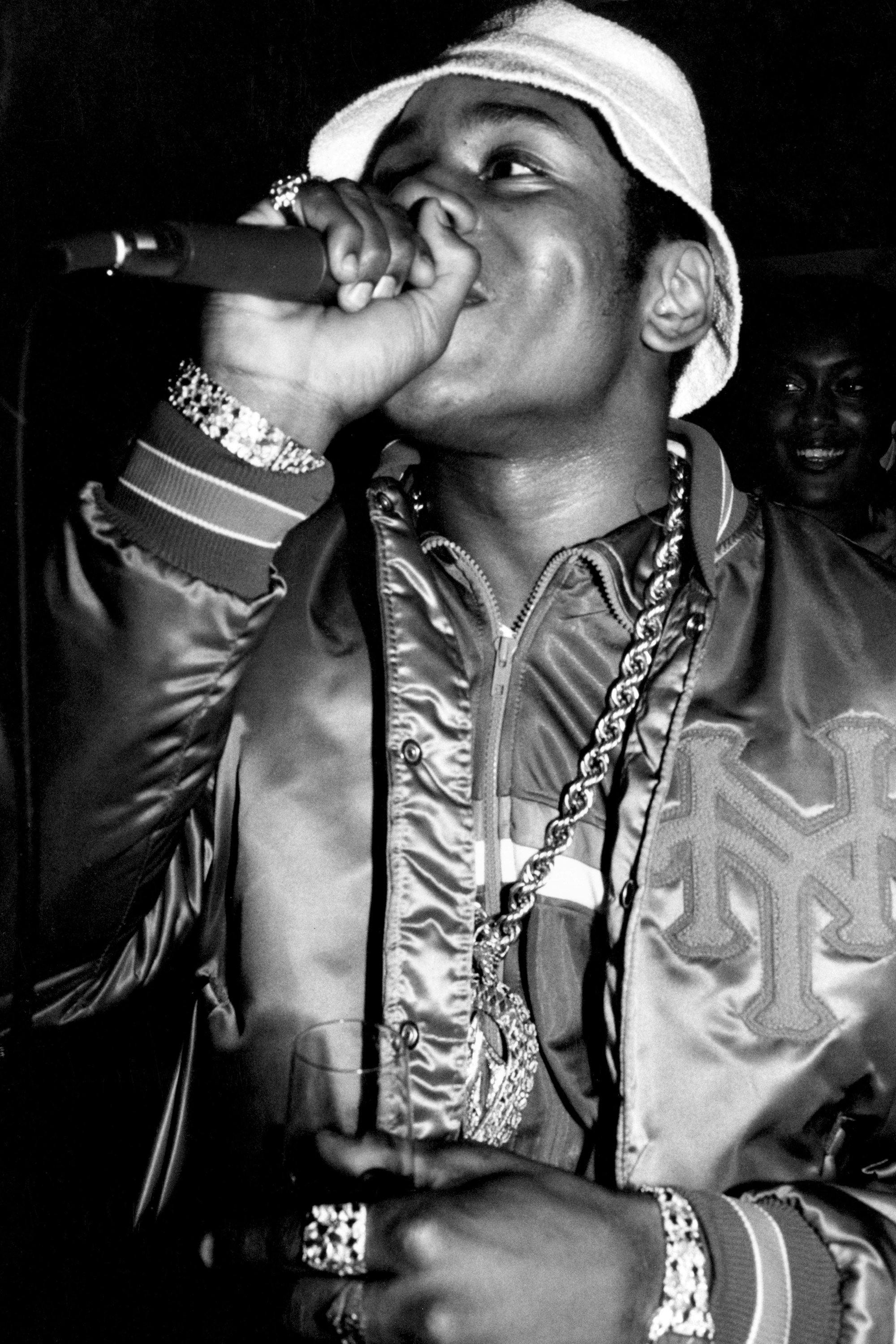
Photo by: Normski/PYMCA-Avalon/Universal Images Group via Getty Images
Bill Adler: LL COOL J as a 16-year-old was good to go. He was fairly fully formed. He had tremendous confidence, tremendous self-possession, the ability to write his ass off, completely magnetic on stage. The thing about these rappers on the basis of my little experience is that if you are an only child, you’re going to grow up to be a solo rapper. If you’re like Run and you have brothers, you’re going to form a group. Todd was an only child and he grows up to be a solo rapper. So he always had that confidence. The artists would come into the office and start snapping on each other. I can remember Run got into it with L, and they went back and forth quite a bit. Each of them had something to say to the other guy every time, and it happened at twice the speed. One of them would say one line and the other guy would come back with a dis that rhymed. The next line. It was fast and furious.
LL COOL J: Run-DMC grew up not far [from me] at all. I used get in fights with members of the Hollis Crew. They were a little older than us.
Bill Adler: It probably would have been sometime in ’84, one of his first solo gigs. He’s at a high school on a bill with Jeckyll & Hyde. The story I think Andre [Harrell of Dr. Jeckyll & Mr. Hyde] tells is he started to understand that he might have to give up his career as a rapper because he appears on a bill with this unknown LL COOL J who crushed the crowd with his performance, and Jeckyll & Hyde got nowhere near that amount of love. Andre starts to think, “Maybe there’s something else I should be doing.”
Dr. Butcher: It was that era where people started introducing scratches into their music. I know Rick Rubin was a big fan of Jazzy Jay, but Cut Creator was better than Jazzy Jay. So he [LL COOL J] wanted Cut Creator to do the scratches for him, and he did so on “I Need a Beat” and “Dangerous,” the follow-up.
Cut Creator: It’s funny. He [LL COOL J] gives me a call and he says, “Phil, can you meet me out in Manhattan? We’re gonna make a record.” I’m like, “OK, whatever man.” I end up meeting him out by NYU, and we ended up in Rick Rubin’s dorm, and that was the first time I met Rick Rubin. There were a couple of white guys talking about making a record. Some people made records, and some people didn’t. I didn’t focus on that part of it. I just liked to DJ. I eventually went with them to the studio. I went to this big warehouse, I guess that was Chung King. I went inside, went in this elevator, and lo and behold there was an actual studio inside. That was my first time hearing the rhyme “I Need a Beat” and the beat also. Rick Rubin was fairly instructive as to what it was he wanted. In retrospect, I’ve gotta give him credit. He had a clear vision for the actual song and what sound he wanted in it. Obviously he couldn’t dictate how I was going to cut on it, but he did mention the points that he wanted it to be emphasized. Essentially that was it. We did a few takes and “I Need a Beat” was done. It was in the middle of the night. It was three or four hours, I would guess, of actual mixing and retaking.
Bill Adler: Rick starts to go into the studio. He put out L’s first record, and he followed that maybe a month later with the first Beastie Boys record [for Def Jam]. And that was a one-two punch in terms of getting the name of the label out there. Both of those records landed like bombs within the relatively small world of rap and Hip-Hop at that time.
LL COOL J: [I went to] Andrew Jackson [High School]. “I Need a Beat” came out in November of ’84, so I only went to high school for three, four, five months. I was out. I just said, “Fuck it.” I had to choose. Either you can go to school here and be here in a scene from Lean on Me, or you could go pursue your rap career. I said, “I’m going after my career, man.”
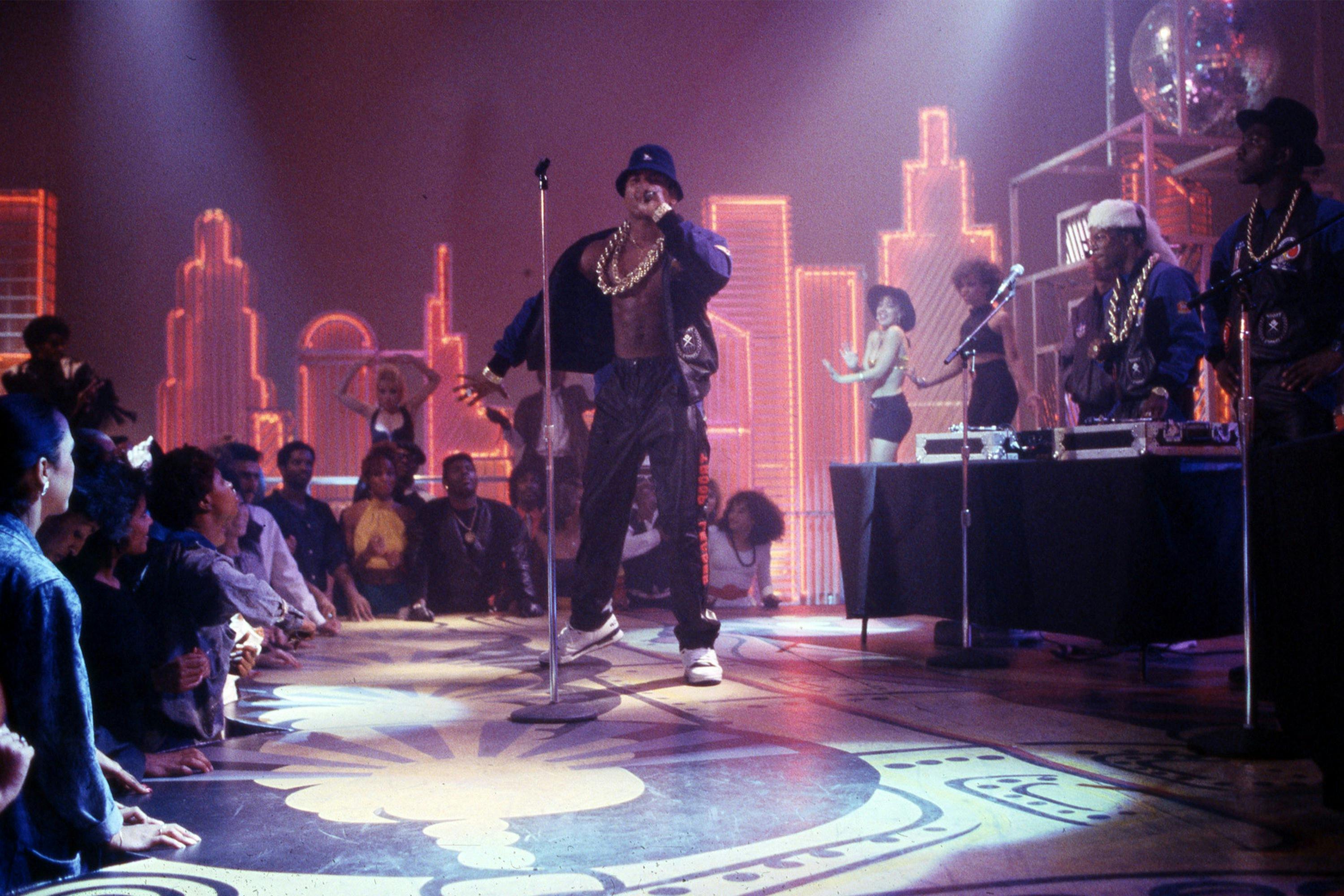
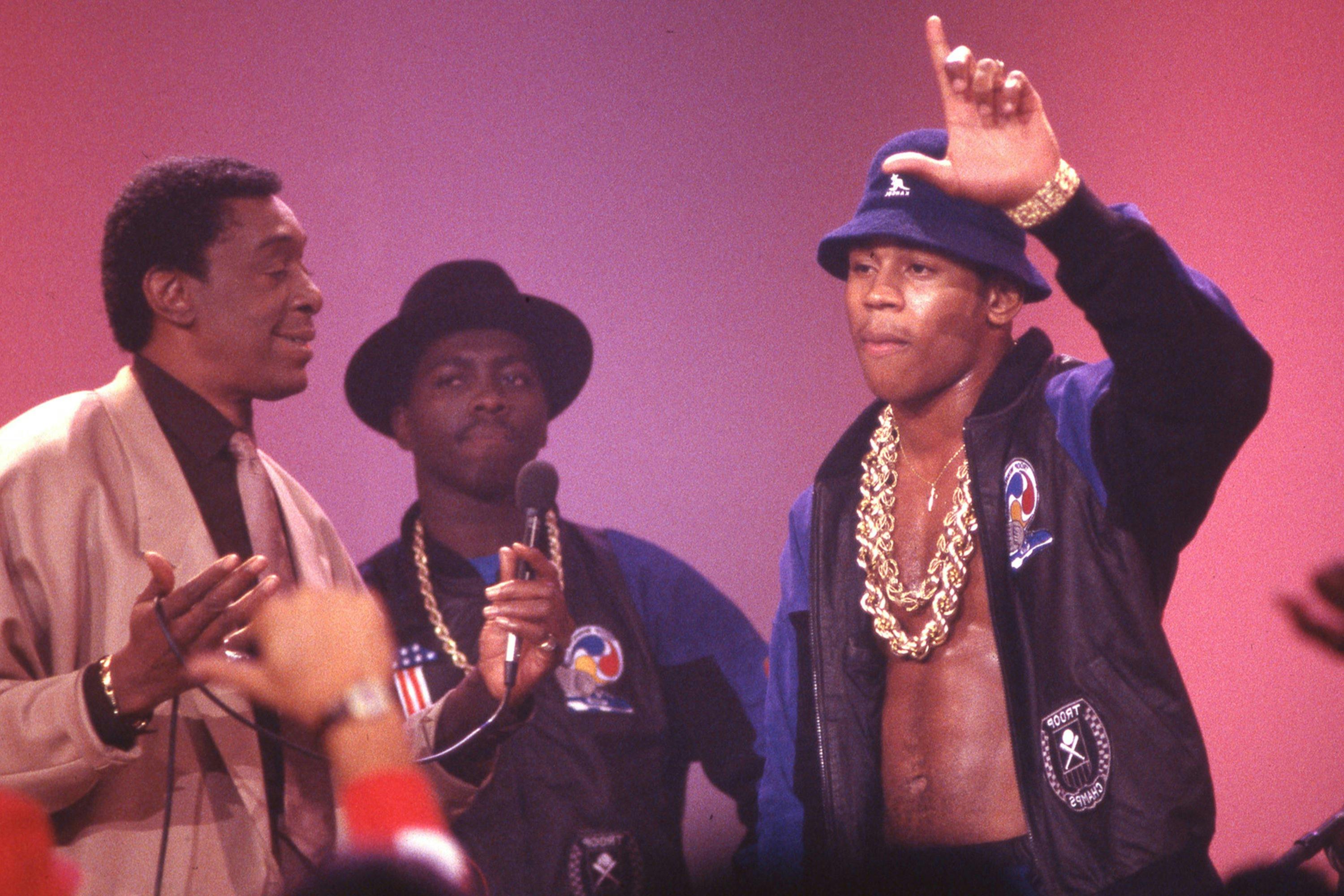
Photos by Soul Train via Getty Images
Cut Creator: That [“Dangerous”] was pretty fun. Rick Rubin had a clear vision about what sounds he wanted. The jam part was what he wanted. The drumroll from “I Need a Beat” he wanted on there in a particular way. James’ style of rap and the way I cut was very simpatico. It moved fairly nicely. It was kind of quick, actually. It [the drum machine] was all pre-programmed in advance. When we got there all that was already set up.
Bill Adler: It stands to L’s credit. He’s one of the first guys to write love songs. It was astonishing for him to be a Run-DMC battle rapper pounding his chest on “Dangerous,” and then on a B side [“I Want You”] he writes a love song? He’s not screaming, he’s just kind of murmuring, and he gets away with it? That’s another element. That’s something no other rapper had at that time.
Cut Creator: We started doing shows and stuff. That kind of stopped and it turned out he was utilizing another cat from his area whose name was Jay Philpot. So that caused a little bit of tension between us.
LL COOL J: Philip [Jean-Remy], he was no longer available. He was always busy. Whatever he was doing he was doing. My other man Philpot, not Philip [Jean-Remy], but Philpot was a big DJ. He came on and he ended up taking on the moniker Cut Creator, and taking it to the level that it went to, because [the name] Cut Creator wasn’t like LL COOL J, it was like Grandmaster. It was a name that a lot of people might have. You might have a Cut Creator T, a Cut Creator Philly Phil, a Cut Creator this, a Cut Creator that. It was a title. So Philpot ended up taking the [name] Cut Creator, doing it that way. I don’t think I ever saw Phil [Jean-Remy] again. I don’t know what happened to him. The first Cut Creator.
Dr. Butcher: Philpot was LL’s manager, like his road manager. When LL did “I Need a Beat” when he did his first performance, it was me, LL, and Philpot who went to the show. That’s when I first met him. Then I realized he was assuming the name Cut Creator because his name is Philpot, and everyone calls him Phil, so it was easy to transition to Cut Creator Philly Phil because they had the same name. He just took on that name.
Cut Creator: I met him [Philpot] once, I believe. I met him in Hollis and he was just around. I didn’t realize that’s what he was doing, that he was essentially assuming my role.
Bill Adler: Here’s the thing about Philpot: I think LL [laughs], I think he’d get into trouble sometimes because he had a big fucking mouth. But he wasn’t a killer himself personally then. And Philpot was a football player. If LL got himself into trouble with his big mouth, Philpot bailed him out. That’s basically what used to happen, I think. Philpot had L’s back.
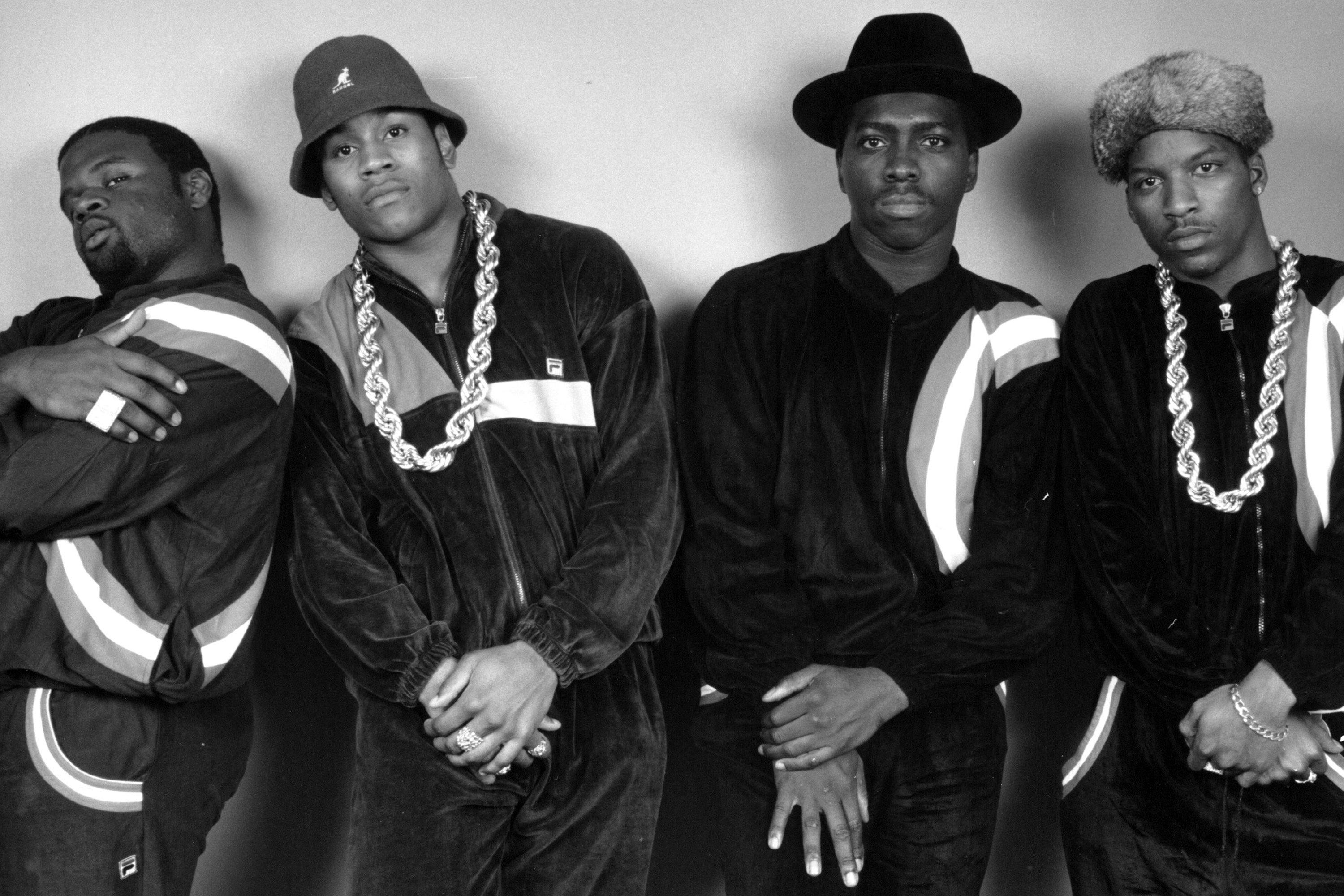
Photo by Sherry Rayn Barnett/ Michael Ochs Archives/Getty Images
Cut Creator: I kind of went about my way, and I get a call one day from him [LL COOL J] asking me to come to the studio to record a song. I didn’t show up for that session. I was pretty put off by that. My mom was giving me grief: “You better not go.” So I didn’t go and that was actually the recording session for “Rock The Bells.” If you listen to the lyrics, in retrospect I see now that he was trying to make amends for it, but at the time I didn’t see it that way. One of the lines in there is “My one-man band is Cut Creator, aka Philpot,” which is a direct reference to the fake Cut Creator. That’s a little irksome — giving it to him without acknowledging who the progenitor of it was. Although that happened then, we were still young. We were still kids, and I can’t really apply a true judgment to any of that.
Dr. Butcher: L, he wanted this to be his career and [the original] Cut Creator didn’t see a career in music at the time. His talents were in force in school. He was determined to go to college and work in engineering or something like that. He’s that type of brainiac. As much as he loved DJing, at that time you didn’t see millionaires or people making JAY-Z money selling records. No one was at that level. He was not gonna sacrifice an education to pursue this record career. It just wasn’t feasible at the time, and it wasn’t something he was gonna do.
Cut Creator: I went to college and from there I did a lot of operations work for various companies, operations manager for a few companies, logistics manager for another. Currently I’m the process manager for a Honda dealership.
Royal Rich: When I met him [LL COOL J], he was always so determined that I kind of knew that when he had gotten a record deal he was gonna go real far. I looked at it like if he made it, we can make it. We was trying to make it, but it didn’t turn out like that. When LL was making records I was still rapping. I was rhyming for a few years, but then, after I started getting a little older, I started to slow down with the rapping. I cut hair now. I still always remain a fan of Hip-Hop.
Cut Creator: At the time, being young, sure, there was a lot of animosity and anger on my side — probably to the point where I didn’t delve as much into Hip-Hop as I probably would have. I deviated away from Hip-Hop and got more into house music, and started dabbling in that a lot. I did a couple of projects with people. I did one with Drew that didn’t come into fruition. We recorded a whole tune using that sample from Inspector Gadget. It was pretty hot.
Roughly four years after Phil Jean-Remy was replaced by Philpot as LL COOL J’s DJ Cut Creator, former Extravagant 3 member Jazzy Drewski ironically became someone else’s replacement DJ, adopting the name Dr. Butcher under the tutelage of Corona neighborhood fixture Kool G Rap (Nathaniel Wilson). Like LL, G Rap was brought up under Silver Fox’s guidance before he joined the legendary Juice Crew collective. By the end of the ’80s, Kool G Rap was putting out groundbreaking records on Cold Chillin’/Warner Bros., pushing the limits of lyricism on a technical front while pushing the envelope of socially accepted subject matter with his vivid descriptions of criminal activity.
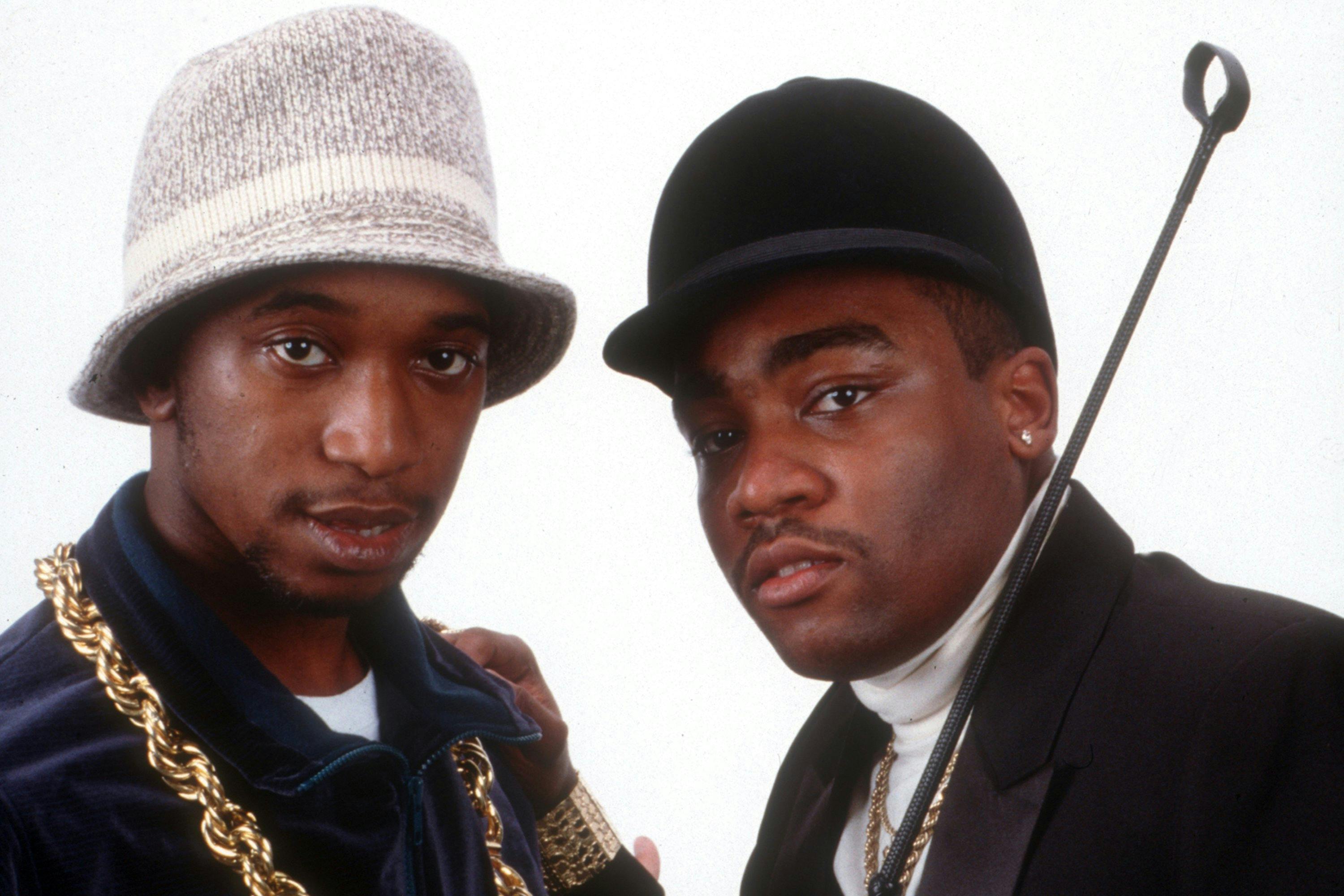
Photo by Michael Ochs Archives/Getty Images
Dr. Butcher: L was out doing his own thing by himself. I transitioned away from the lyrics, from the mic, and was more focused on DJing. Kool G Rap, as he got into working on his first album, there was another guy in our neighborhood named Camille, rest in peace, [whose] parents owned a record store. This guy had a nice record collection. He initially through G Rap was mentored to be Dr. Butcher. [Kool G Rap] was like, “I want a good DJ down with me, and I’m gonna call him Dr. Butcher,” and he had the rhymes written for the name and everything. G Rap wanted him [Camille] to come to the studio to bring records and put ideas together at [producer] Marley Marl’s house. Camille didn’t wanna do it. He would never show up. He refused to bring records. Still at this point, I never told him [Kool G Rap] I could DJ. He was oblivious. I didn’t say anything. So he starts his second album and I hook him up with a friend of mine named Karen — a very pretty girl that everybody wanted. I connected him with her. One day he’s talking about needing a DJ and she’s like, “What are you talking about? Why don’t you just let Drew do the DJing?” And he’s like, “Drew? He DJs?” She’s like, “What do you mean? You never seen him DJ?” And he said, “No. I just know him from rapping.” And she started laughing. And she’s like, “I think you need to go to the house to watch him.” And he called me and he’s like, “Dude, what is Karen talking about? You DJ?” And I just laughed on the phone. I didn’t say anything. He’s like, “We’re coming over.” When he came, I just started. He saw me, and he just couldn’t believe it. He was just like, “Dude, you’re funny,” and he just kept laughing. Then he called Eric B. and he’s all, “Hey man, we’re gonna meet at the studio. I need you to see this.” Eric B. was the executive producer on the Wanted: Dead or Alive album [by Kool G Rap & DJ Polo]. I just set up and I start getting busy in the studio. They put the song “Kool Is Back” up and I started scratching over the beat, and they recorded me. I had never heard it. I didn’t know they were recording the scratches, and they saved everything. They unmuted the scratches at the end of the song and they came in exactly as I did them. He wanted Eric B. to see what I could do because he wanted me to be Dr. Butcher. And at that point he’s like, “Look man, I’m not gonna mess with Camille. You’re gonna be Dr. Butcher.” And I was cool with Polo because Polo was somebody I looked up to, because he was a part of Spinmasters when I was a little kid. And he was fully cool with it. He was like, “If anybody can take this role it’ll be Drew. This is like a little brother to me, so I have no problem with him coming in to do the work.”
Drew, having been newly christened Dr. Butcher, recorded cuts and scratches on much of the sophomore Kool G Rap & DJ Polo album Wanted: Dead or Alive. Queens MC-producer Large Professor (William Paul Mitchell), who worked on the album at the same time as Let the Rhythm Hit ’Em by Eric B. & Rakim and Breaking Atoms by his own group Main Source, inspired Drew to get into production himself.
Dr. Butcher: Large [Professor] had bought his first SP-1200 [sampler]. He had got a couple because he had signed a production contract with Rush Productions, and he was making a lot of money. He had bought a second SP-1200. He told me to take it. He wrote the instructions down on a piece of paper, gave it to me, I took it home, and I started working on beats and putting beats together. I would go record shopping with him all the time. I was trying to build a record collection. That’s how it all started. Polo schooled me on the business. He’s like, “Hey, the money’s in the producing. So you know, you may want to start looking at producing, not just DJing. You’re not gonna make any more money just DJing.” So I kind of minded it and took up the role of producing, as well.
After becoming an international superstar, releasing several multiplatinum albums as the most recognizable solo rapper of his generation, LL COOL J managed to stay grounded and stay in touch with his mates from the Extravagant 3.
Dr. Butcher: I could still call him. He would call me and play me his albums. The BAD album, all that stuff. Radio. I heard all that stuff way before it was released. There are songs that he let me hear on the BAD album that never came out that were probably better than anything on the album. We were really cool.
LL COOL J: I’ve always had a common bond and brotherhood with them. Definitely me and Drew have always been tight, as well. That’s real shit.
Dr. Butcher: Me and him maintained the best type of friendship for a long time. He ended up moving to LA, but whenever he was in New York he would make it his business to call me, or we’d go hang out. One time him, me, and G Rap hung out and went to a movie theater. That was a big deal, to see them two top dogs walking in the ghetto [laughs]. People were just looking at them like they were crazy.
Royal Rich: There would be times when he [LL COOL J] would stop by and see how I’m doing and hang around and we’ll talk. That went on for a few years, then I saw him less and less.
Dr. Butcher: We [LL COOL J and myself] would always hang out and do things. He liked that. Still on the phone for hours. He would come see me and stay at my house five, six hours. We would stay up all night long listening to records and talking. The relationship never changed.
LL COOL J: I’ve been very fortunate, and it’s not like I can take all the credit myself. A lot of it is a blessing. I believe in God. And then there’s luck. You get some fairy dust sprinkled on you and good things happen. That’s how it worked out. Those were happy times.
* Banner Image: Unisphere at the World’s Fair, Queens / Getty Images

